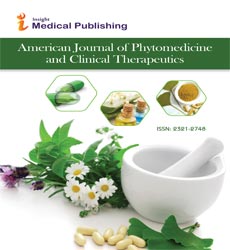ISSN : 2321-2748
American Journal of Phytomedicine and Clinical Therapeutics
Editorial Note on Tulsi (Ocimum sanctum): A Herb
Monika*
National University Hospital of Iceland, Reykjavik, Iceland
- *Corresponding Author:
- Monika
National University Hospital of Iceland, Reykjavik, Iceland
E-mail:a@gmail.com
Received Date:November 05, 2021; Accepted Date: November 19, 2021; Published Date:November 25, 2021
Citation: Monika (2021) Editorial Note on Tulsi (Ocimum sanctum): A Herb. Am JPhytomed Clin Ther Vol.9 No.11:52
Editorial
Ocimum sanctum known as Holy basil in English or Tulsi, is an aromatic-medicinal plant of the genus Ocimum belonging to family Lamiaceae. It is well known for its medicinal and spiritual properties in Ayurveda, different parts (leaves, stem, flower, root, seeds and even whole plant) of Ocimum sanctum Linn. Have been recommended for the treatment of bronchitis, diarrhea malaria, skin disease, dysentery, arthritis, eye diseases, insect bites etc. Of all the herbs used within Ayurveda, tulsi (Ocimum sanctum Linn) is preeminent, and scientific research is now confirming its beneficial effects. There are many advantages and benefits associated with the use of medicinal plants, the main ones being their cost effectiveness and global availability. The use of tulsi in daily rituals is a testament to Ayurvedic wisdom and provides an example of ancient knowledge offering solutions to modern problems..
Tulsi has been found to protect organs and tissues against chemical stress from industrial pollutants and heavy metals, and physical stress from prolonged physical exertion, ischemia, physical restraint and exposure to cold and excessive noise. Tulsi has also been shown to counter metabolic stress through normalization of blood glucose, blood pressure and lipid levels, and psychological stress through positive effects on memory and cognitive function and through its anxiolytic and anti-depressant properties. Tulsi is perhaps one of the best examples of Ayurveda's holistic approach for a healthy lifestyle. Tulsi tastes hot and bitter and is said to penetrate the deep tissues, dry tissue secretions and normalize kapha and vata. Daily consumption of tulsi is said to prevent diseases, promote health, wellbeing and longevity and assist in dealing with the stresses of daily life, it is regarded in Ayurveda as a kind of ‘elixir of life’. Traditionally, Tulsi is used in different forms; aqueous extracts from the leaves (fresh or dried as powder) are used in herbal teas or mixed with other herbs or honey to enhance the medicinal value. Traditional uses of Tulsi aqueous extracts include the treatment of different types of poisoning, common colds, stomach-ache, malaria, headaches, inflammation, and heart disease.
Oils extracted from the leaves and inflorescence of Tulsi have been claimed to have numerous useful properties, including as expectorants, anti-emetics, analgesics, and anti-pyretics; stress reducers and inflammation relievers; and as anti-asthmatic, hypoglycemic, hepatoprotective, hypotensive, hypolipidemic, and immunomodulatory agents. Eugenol (1-hydroxy-2-methoxy-4- allylbenzene), the active constituents present in O. sanctum L. have been found to be largely responsible for the therapeutic potentials. Tulsi's eugenol and linoleic acid content and inhibits both the cyclooxygenase and the lipoxygenase pathways of arachidonic acid metabolism.
This enables tulsi to exert anti-inflammatory effects comparable to nonsteroidal anti-inflammatory drugs such as phenylbutazone, ibuprofen, naproxen, aspirin and indomethacin. Tulsi essential oil contains a valuable source of bioactive compounds such as camphor, eucalyptol, eugenol, alpha bisabolene, beta bisabolene, and beta caryophyllene. These compounds are proposed to be responsible for the antimicrobial properties of the leaf extracts in skin infections caused by these organisms or as a wound dressing to prevent infection and reduce the risk of development of resistance to valuable antibiotics

Open Access Journals
- Aquaculture & Veterinary Science
- Chemistry & Chemical Sciences
- Clinical Sciences
- Engineering
- General Science
- Genetics & Molecular Biology
- Health Care & Nursing
- Immunology & Microbiology
- Materials Science
- Mathematics & Physics
- Medical Sciences
- Neurology & Psychiatry
- Oncology & Cancer Science
- Pharmaceutical Sciences
